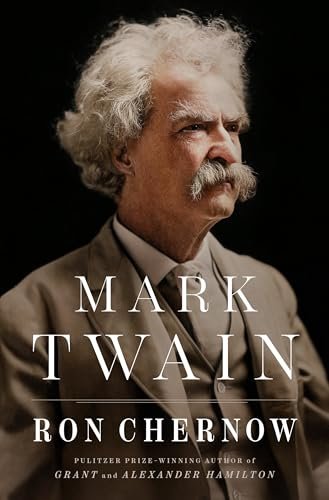
05 Jun Book Review of Mark Twain
Embracing the Contradictions: A Journey Through Ron Chernow’s Mark Twain
From the moment I first encountered Mark Twain’s words as a young reader, I was captivated. His blend of humor, wit, and poignant insight spoke to me, knitting a tapestry of life that seemed both timeless and uniquely American. With Ron Chernow’s recent biography, Mark Twain, I found an opportunity not just to explore the man behind the stories but to dive deep into the intricate layers of his life. Chernow has crafted a portrait that is as engaging as it is revealing—one that captures Twain’s essence with breathtaking clarity.
Chernow organizes the narrative beautifully into five distinct sections—Afloat, Floodtide, Rapids, Whirlpool, and Shipwreck. This metaphor of a river journey resonates perfectly with Twain’s own history as a Mississippi riverboat pilot. It reflects his trajectory from boyhood in Hannibal, Missouri, through the tumultuous waters of fame and financial disaster, to his later years marked by profound grief. I found this structure not just a clever choice but an immersive way to track Twain’s worldview, which evolved from the mischievous boy of Tom Sawyer to the somber philosopher in Letters from the Earth.
Chernow excels in digging deep into Twain’s life, crafting a richly layered portrait that incorporates more than just literary achievements. I was especially struck by Chernow’s unflinching portrayal of Twain’s contradictions—a Southern-born man who fiercely criticized slavery, a comedic genius wrestling with deep personal loss, and a family man whose emotional absences left scars. Chernow doesn’t shy away from these complexities; instead, he invites readers to embrace them. I found myself reflecting on Twain’s paradoxes long after finishing the book—an encounter with a man both flawed and extraordinary.
However, as engaging as this narrative is, it does have its pacing issues, especially in the middle sections that delve into Twain’s early career and financial misadventures. At times, the exhaustive detail felt overwhelming, nudging me to skim through parts rather than soak in the richness of the material. Moreover, while Chernow skillfully contextualizes Twain’s works within his life story, some may find a desire for deeper literary analysis unmet. Still, his keen insight into Twain’s psychological landscape—particularly the impact of personal tragedies on his later work—resonated powerfully with me.
One of the most rewarding aspects of the biography is Chernow’s vibrant portrayal of those surrounding Twain, including Olivia "Livy" Clemens, who emerges as a poignant moral compass amid the chaos and contradictions. It’s a reminder that no great man (or woman) stands alone; the rich tapestry of their lives is woven with family, friends, and even adversaries.
Ultimately, Mark Twain is more than just a biography; it’s a cultural history that captures the spirit of a man who reflected and critiqued the very fabric of his nation. Chernow’s vivid prose, accessible yet scholarly, paints a portrait that’s not only informative but engaging. As I closed the book, I felt as if Twain’s voice echoed anew—full of humor and heart, yet steeped in a profound understanding of life’s contradictions.
This book is a treasure for anyone who cherishes literature, American history, or simply the nuances of human experience. Whether you’re a lifelong Twain devotee or a curious newcomer, Chernow’s work invites you to explore a life that is inextricably linked to the American narrative. In so doing, he reminds us that while Twain may no longer be with us, his indelible mark on our culture and consciousness lives on. I walked away from this reading experience not only with a deeper appreciation for Twain but also with a renewed sense of curiosity about the complexities we all embody.









